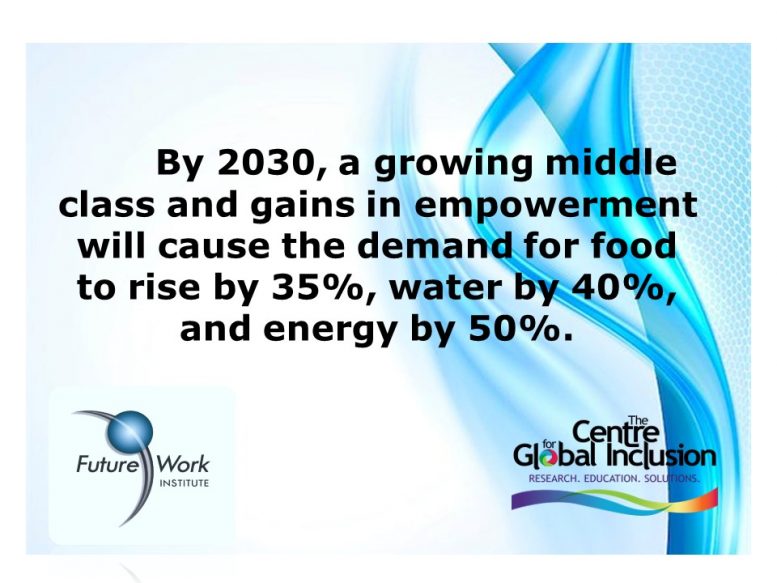This week, we have put the two other megatrends together from the National Intelligence Council’s Global Trends 2030: Alternative Worlds report. In addition to the two trends we summarized last week: A Dramatically Different World and Diffusion of Power, the Council predicted increased Individual Empowerment, a Growing Middle Class and Demand for Food, Water and Energy.
Individual Empowerment
Over the next 15 to 20 years, continued giving from groups like the World Health Organization and the Bill and Melinda Gates Foundation will lift millions of people out of poverty. As a result, the majority of the world’s population will no longer be impoverished. This new wealth will produce millions more empowered individuals that will have the means to add to local and national economies.
A Growing Middle Class and Demand for Food, Water and Energy
According to the report, a growing middle class and gains in empowerment will lead the demand for food to rise by 35%, water by 40%, and energy by 50%. Regions with extreme weather patterns — like rain-soaked Singapore or muggy Mumbai — will get more extreme due to the effects of climate change. Dry areas such as northern Africa and the U.S. Southwest will feel the effects of diminished precipitation especially hard.
The updated report from the Council, describes three alternative scenarios for 2030: ”Islands,” “Orbits,” and “Communities“. It explores how critical trends and choices might intersect to create different paths to the future. These scenarios postulate alternative responses to near-term volatility—at the national (Islands), regional (Orbits), and substate and transnational (Communities) levels.
The “Island” scenario underscores the choices governments will face in adjusting to changing economic and technological conditions that might lead some to turn inward, reduce support for multilateral cooperation, and adopt protectionist policies and others to find ways to leverage new sources of economic growth and productivity.
The “Orbits” scenario explores a future of tensions created by competing major powers seeking their own spheres of influence while attempting to maintain stability at home. It examines how the trends of rising nationalism, changing conflict patterns, emerging disruptive technologies, and decreasing global cooperation might converge to increase the risk of interstate conflict.
The “Communities” scenario explores the issues that arise as the enormity of future economic and governance challenges test the capacity of national governments to cope, creating space for local governments and private actors and thus questioning assumptions about the future of governance. It emphasizes the trends associated with the changing nature of power and advances in ICT (Information and Communications Technology) that are enabling a broader array of influential actors and identifies how these trends might lead to choices that create both opportunities and hurdles for future governance.
For a full description of these three scenarios and their implications, go to:


